Introduction
Who does Jesus say He is?
The book of John describes Jesus beautifully, beginning with in verse 1 “In the beginning was the Word, and the Word was with God, and the Word was God.” But I want to skip to verses 9-13 because it gives a nice introduction to our lesson today.
The true light that gives light to everyone was coming into the world. He was in the world, and though the world was made through him, the world did not recognize him. He came to that which was his own, but his own did not receive him. Yet to all who did receive him, to those who believed in his name, he gave the right to become children of God – children born not of natural descent, nor of human decision or a husband’s will, but born of God.
Jesus gave us the right to become His children, and all we have to do is believe.
We’re beginning a 7 week series on the “I AM” statements of Jesus. Seven times Jesus said “I AM”, which in Hebrew times “seven” meant “complete”. In Judaism, when Jesus said, “I AM,” it was no mystery to the people that Jesus was declaring His divinity. In Exodus 3:14, when Moses asked God who told Moses to lead His people, God replied, “I AM WHO I AM.” I imagine thundering rolling from the clouds as God made this pronouncement.
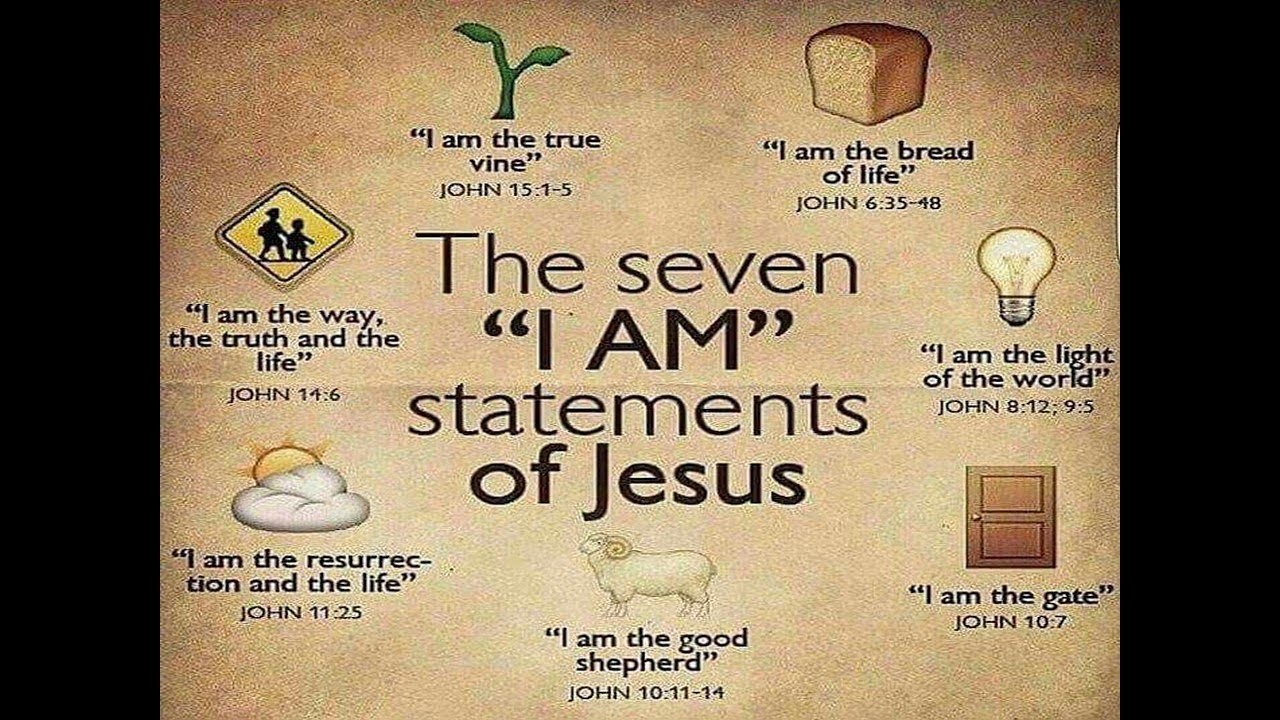
The seven “I AM” statements from Jesus explain His ministry to us and His relationship to the Father. These statements are –
-
-
- I AM the Bread of Life
- I AM the Light of the World
- I AM the Door
- I AM the Good Shepherd
- I AM the Resurrection and the Life
- I AM the Way and the Truth and the Life
- I AM the True Vine
-
We’ve probably all heard the phrase Jesus said, “I AM the Bread of Life,” but today we’re going to dig into it and understand what Jesus was saying. Jesus was able to take a complex theological ecclesiology and make it easy to remember, “I AM the bread of life.” But the meaning behind it eluded the people following Jesus, and it still eludes people today, despite its simplicity.
In John 6, which is all about food, it begins with crowds following Jesus. Once Jesus had begun in ministry of miracles and healing the sick, people began to seek Jesus. But the people are misunderstanding *why* Jesus is performing miracles. The people just want Jesus to do more. Jesus takes his disciples across the Sea of Galilea, which isn’t a huge distance, about 4 miles across.
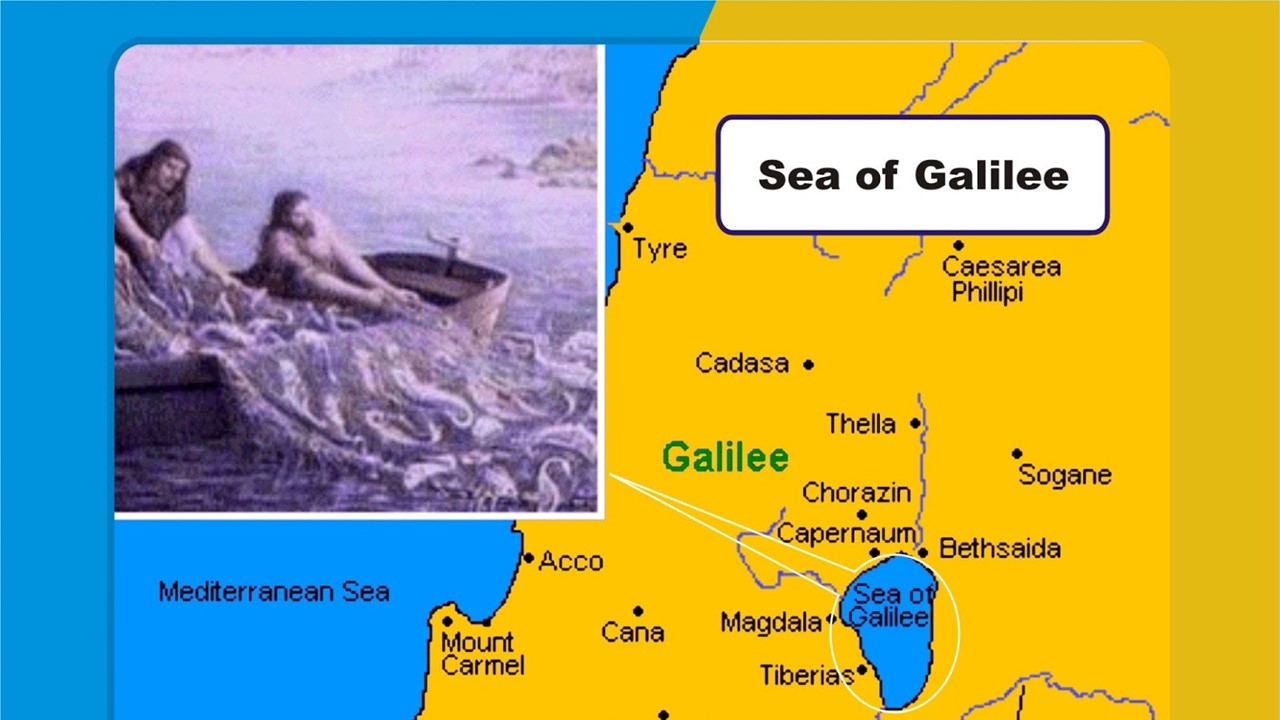
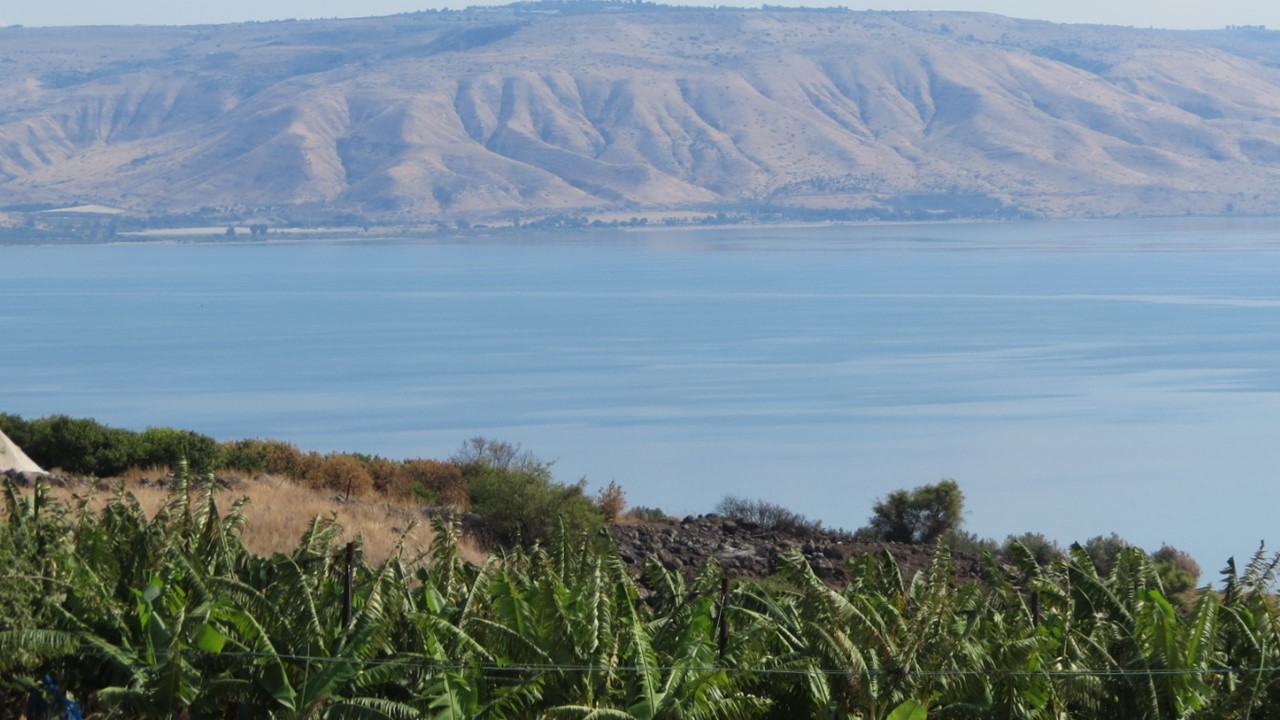
The crowd followed him to the other side and while the sea isn’t that large, it’s a long way from any restaurant. There were 5000 men, and maybe an equal amount of women and children, and I imagine Jesus is grinning inside when He asks Philip in John 6:5,
When Jesus looked up and saw a great crowd coming toward him, he said to Philip, “Where shall we buy bread for these people to eat?”
You’ve heard the rest of this story. A small boy has what might be his lunch, five small barley loaves and two small fish. Jesus gives thanks, and then proceeds to feed the 5000. Afterwards, in verse 12-13,
When they had all had enough to eat, he said to his disciples, “Gather the pieces that are left over. Let nothing be wasted.” So they gathered them and filled twelve baskets with the pieces of the five barley loaves left over by those who had eaten.
I believe Jesus intentionally uses bread here for His miracle, as well as having an abundance of bread after everyone was filled to illustrate his “I AM the bread of Life” statement He will be making soon. But how did the people respond? Verse 14-15 –
After the people saw the sign Jesus performed, they began to say, “Surely this is the Prophet who is to come into the world.” Jesus, knowing that they intended to come and make him king by force, withdrew again to a mountain by himself.
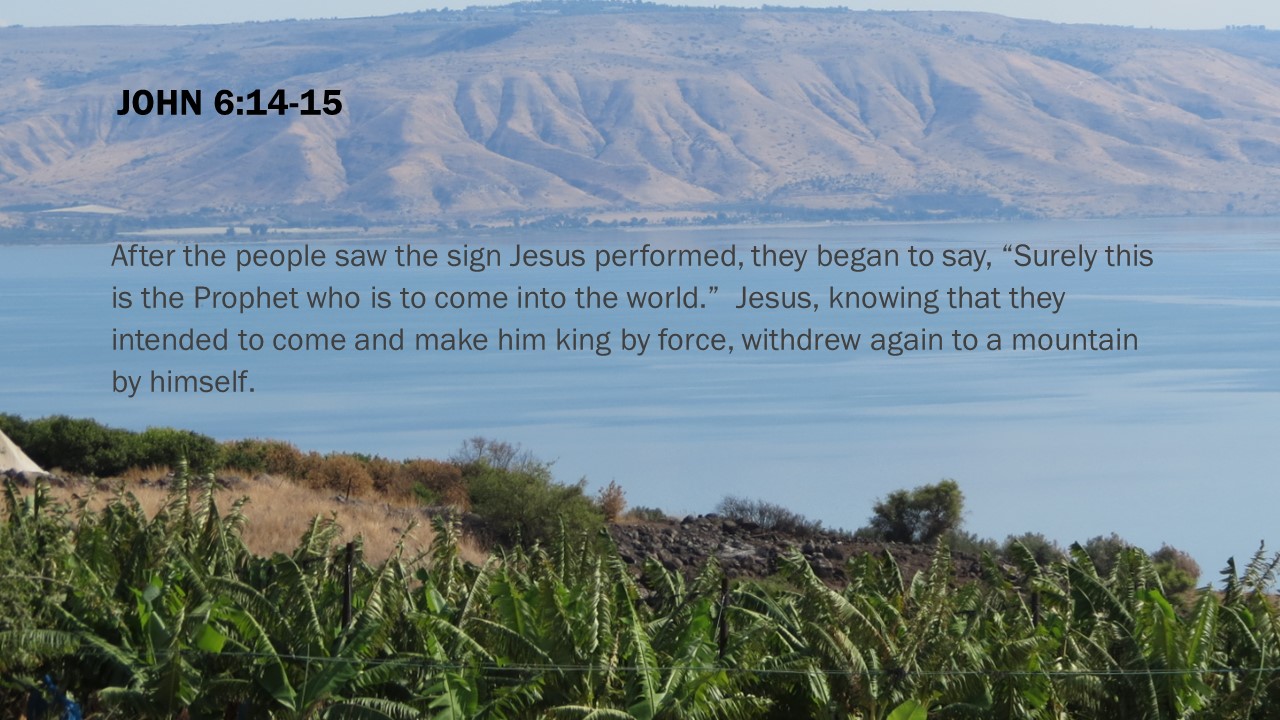
That evening, the disciples got in boat to go to Capernaum. Jesus is still on the mountain. It got dark and windy, the disciples became afraid, and then Jesus walked on water toward them, a miracle just for the disciples.
The next day, the crowd is wondering where Jesus is. They know He didn’t get into the boat with the disciples. When Jesus doesn’t return, they go looking for Him in Capernaum. And when they get to Capernaum, there’s Jesus. And they’re puzzled. They say in verse 25,
When they found him on the other side of the lake, they asked him, “Rabbi, when did you get here?”
And Jesus begins to teach, completely ignoring their question. I can appreciate the deliberate ministry of Jesus. The question of how he arrived in Capernaum is irrelevant. Instead, Jesus immediately begins to teach.
Now, Jesus is not speaking to believers. He is speaking to people seeking Jesus. Remember, in verse 15, just after feeding the 5000, these people tried to make Him king. These people were looking for a messiah to overthrow Rome, and they thought Jesus was that guy. Jesus will save us from Rome, we’ll make Him king. And remember, Jesus was disappointed and went up on the mountain by Himself after that.
Now when they see Jesus, they’re no longer calling Him “messiah” or “king”. Now they call Him “rabbi” or “teacher.” Ok, so you’re not the mighty warrior, you’re just a teacher. A teacher that somehow magically appeared in Capernaum, but still just a teacher.
I think we can find many people like that in churches today. People who claim they are following Jesus, who attach themselves to Jesus because they believe Jesus will give them stuff and solve their problems and heal their sickness, but have not understood what their relationship with Jesus is. Jesus can do all things, but He does them for His purpose. I think many people only call themselves Christian because of material things, which Jesus is about to explain misunderstands His purpose among us. In verse 26, Jesus knows their confusion.
Jesus answered, “Very truly I tell you, you are looking for me, not because you saw the signs I performed but because you ate the loaves and had your fill.
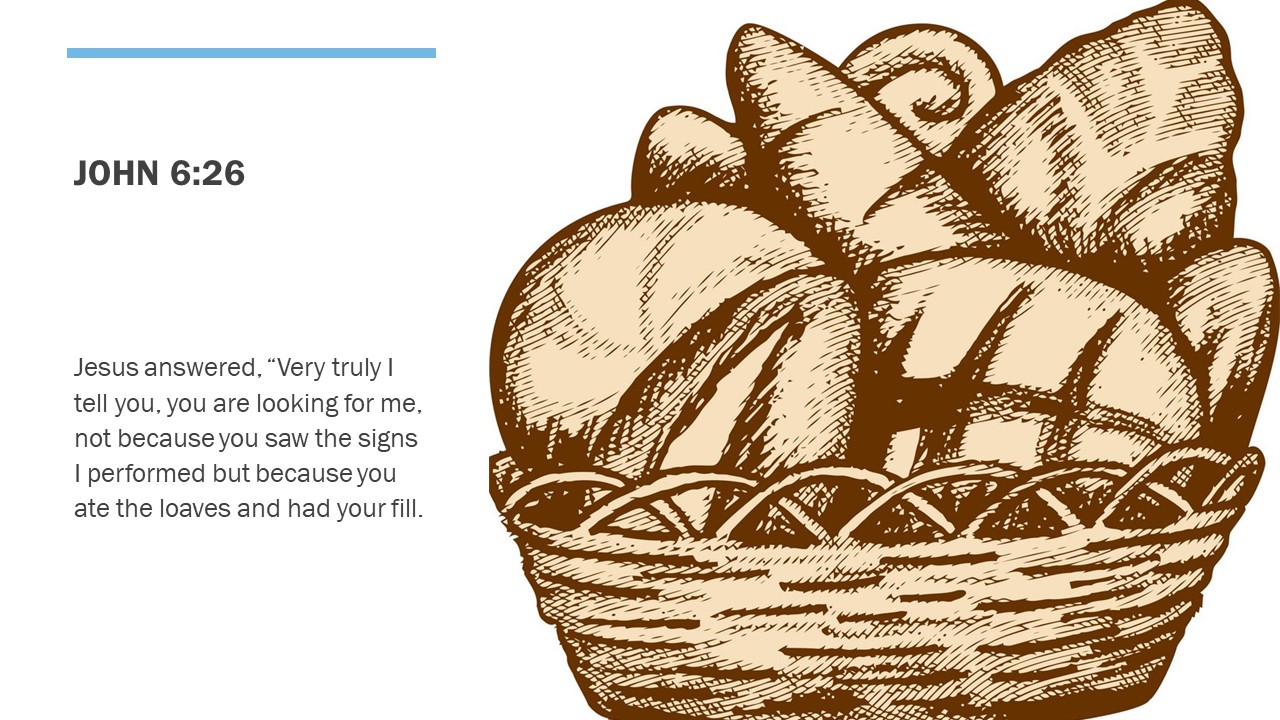
Jesus says the only reason the people are following him is because they want stuff. They want to eat, to feed their stomachs for a day. That is what the fall of man has produced, a broken connection with our Creator. And man cares about the natural, not the spiritual. It cares about the temporal, not the eternal. It cares about a full belly, not a clean heart. Jesus knows this – He knows what is in the heart of man because He created us. We want our food, our entertainment, our bread and circuses. Anything else? Nope, we’re good, thanks.
Jesus wants us to recognize that our sin nature separates us from God. People say, Jesus, fix my health. Jesus, fix my business. Jesus, fix my children. Jesus, fix my marriage. And Jesus says, “Hold on. I came to fix you.” Of course, Jesus cares for our physical circumstances, but that’s not why He came. Jesus offers so much more. Jesus wants to change us on the inside.
So Jesus tells the seekers in verse 27 –
Do not work for food that spoils, but for food that endures to eternal life, which the Son of Man will give you. For on him God the Father has placed his seal of approval.
Jesus offers the bread of life. Jesus offers manna from heaven. There are two Greek words used for our English word “life;” “Bios” refers to physical existence. “Zoe”, used here, refers to quality of life both essential and ethical, not just merely living, but living for a purpose, living life to the fullest. It answers the question, “why do we live?”
Jesus has the answer. He has the authority and dominion. He calls Himself here “Son of Man,” a title from this verse about end times prophecy from Daniel 7:13-14 –
“In my vision at night I looked, and there before me was one like a son of man, coming with the clouds of heaven. He approached the Ancient of Days and was led into his presence. He was given authority, glory and sovereign power; all nations and peoples of every language worshiped him. His dominion is an everlasting dominion that will not pass away, and his kingdom is one that will never be destroyed.
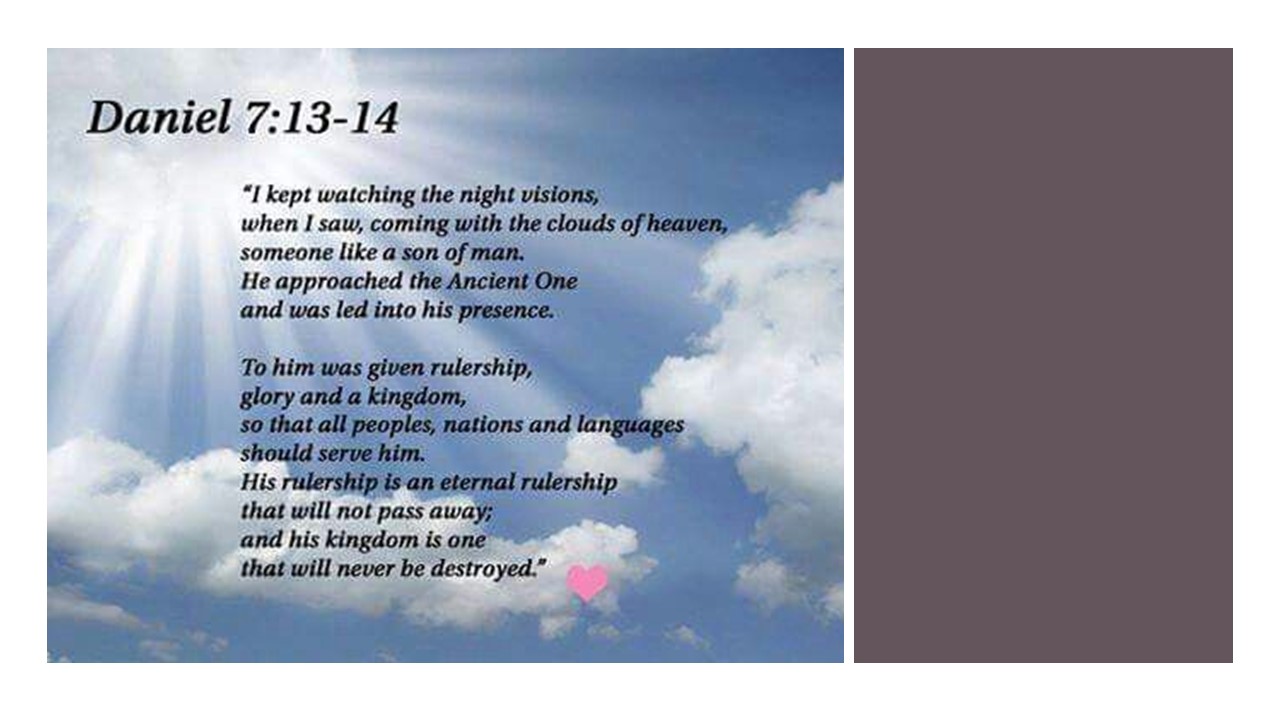
Jesus is claiming to be the son of man, claiming His deity, claiming to be God, and the people believed this to be blasphemy. Jesus can give zoe, the answer to life. Instead, the people just wanted their physical bread. Instead of eternal life, they wanted a sandwich.
So how do you get eternal life? Verse 27 tells us,
Do not work for food that spoils, but for food that endures to eternal life, which the Son of Man will give you. For on him God the Father has placed his seal of approval.
Jesus gives it to us. It’s a gift. We don’t earn it, we don’t purchase it. We are saved completely, 100%, by the grace of God, not by works.
Did the crowd understand that it was a gift? Do we understand it’s a gift? Verse 28,
Then they asked him, “What must we do to do the works God requires?”
The crowd is clueless. Still. Jesus says, “eternal life is a gift I give to you” and the crowd responds, “well, how do we earn it?”
The human condition is fallen, but we all believe we have to do something to merit God’s favor. Christianity is so unlike every other religion. In every other religion, man is working his way to God. In Christianity, God works His way to man. It’s a relationship.
Fallen man wants to earn salvation. Like the crowd responded, “What must we do?” Works, works, works. What do I have to do to please god? Immediately after the fall of man, we started trying earn our way back. In Genesis 3:6-7,
When the woman saw that the fruit of the tree was good for food and pleasing to the eye, and also desirable for gaining wisdom, she took some and ate it. She also gave some to her husband, who was with her, and he ate it. Then the eyes of both of them were opened, and they realized they were naked; so they sewed fig leaves together and made coverings for themselves.
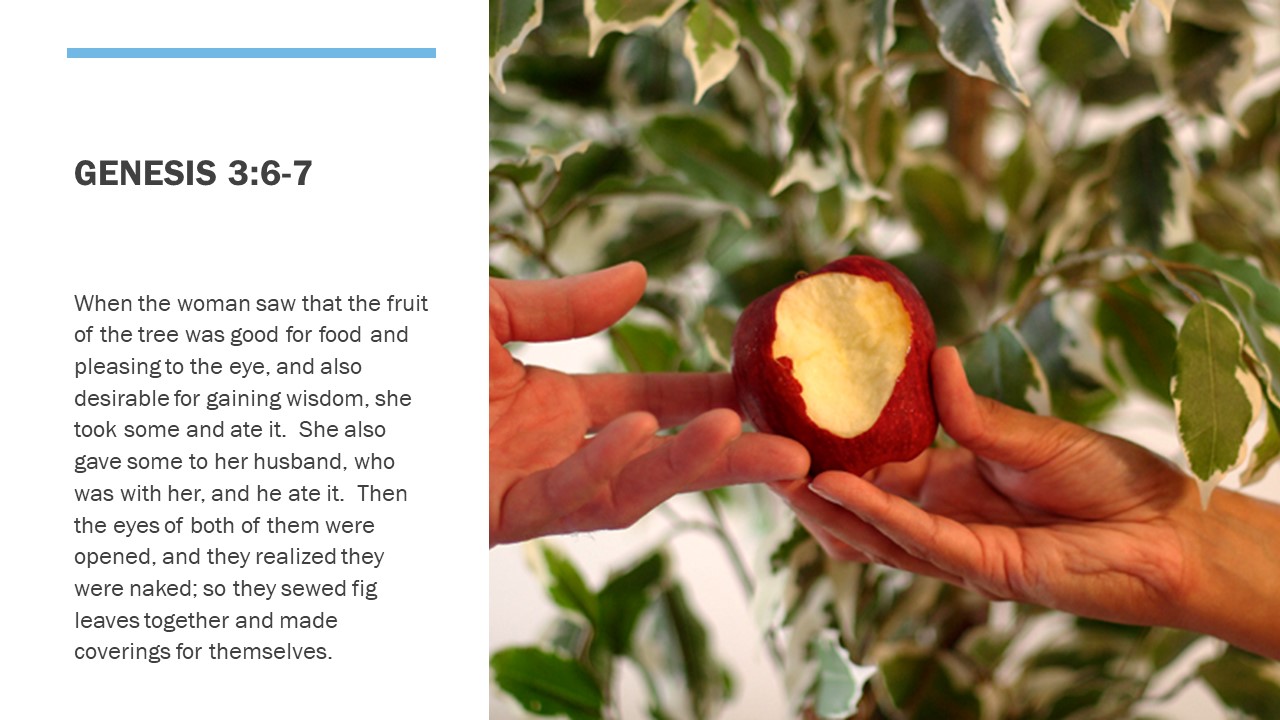
They were naked, so they made loincloths. The fall has happened and we have to do something to fix it. This was the beginning of religion when we used to have a relationship.
Paul, writing to the Philippians, understood how fruitless his work were. Paul had every reason to boast: he was the perfect Jew. Philippians 3:4b-6 –
If someone else thinks they have reasons to put confidence in the flesh, I have more: circumcised on the eighth day, of the people of Israel, of the tribe of Benjamin, a Hebrew of Hebrews; in regard to the law, a Pharisee; as for zeal, persecuting the church; as for righteousness based on the law, faultless.
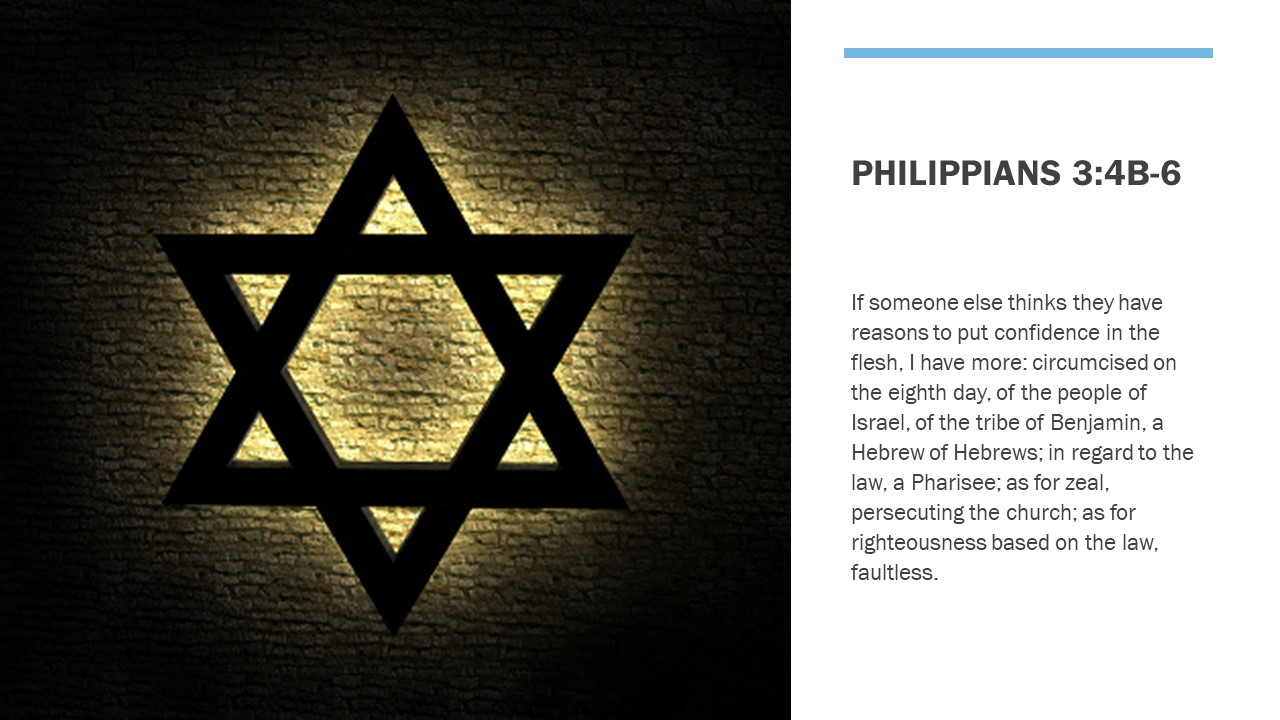
If anybody could fulfill the law, Paul did. He lays out all the reason Paul should be saved, as though God owed Paul something for living a perfect life.
Does God owe us something? So many people are mad because God doesn’t provide what they want. Why does god owe you? If you die tonight, people believe they should have eternal life because I go to church. Because I’m a good person. Because I give to the poor, I I I I me me me me I try hard I go to bible study I have the 10 commandments memorized… but our relationship with God is not based on I I I I me me me me, it’s not based on what we do, but trusting in what He did for us. The crowd asks, “what shall we do?”
Jesus corrects them in verse 29 –
Jesus answered, “The work of God is this: to believe in the one he has sent.”
Jesus says, you wanna work? Then believe. Why do we want to work for our salvation? I think it’s because we can boast when we walk into heaven. Look at what I did! But God doesn’t want our works if it’s taking credit for what He did. He hates boasting. Isaiah 64:6 says,
All of us have become like one who is unclean, and all our righteous acts are like filthy rags.
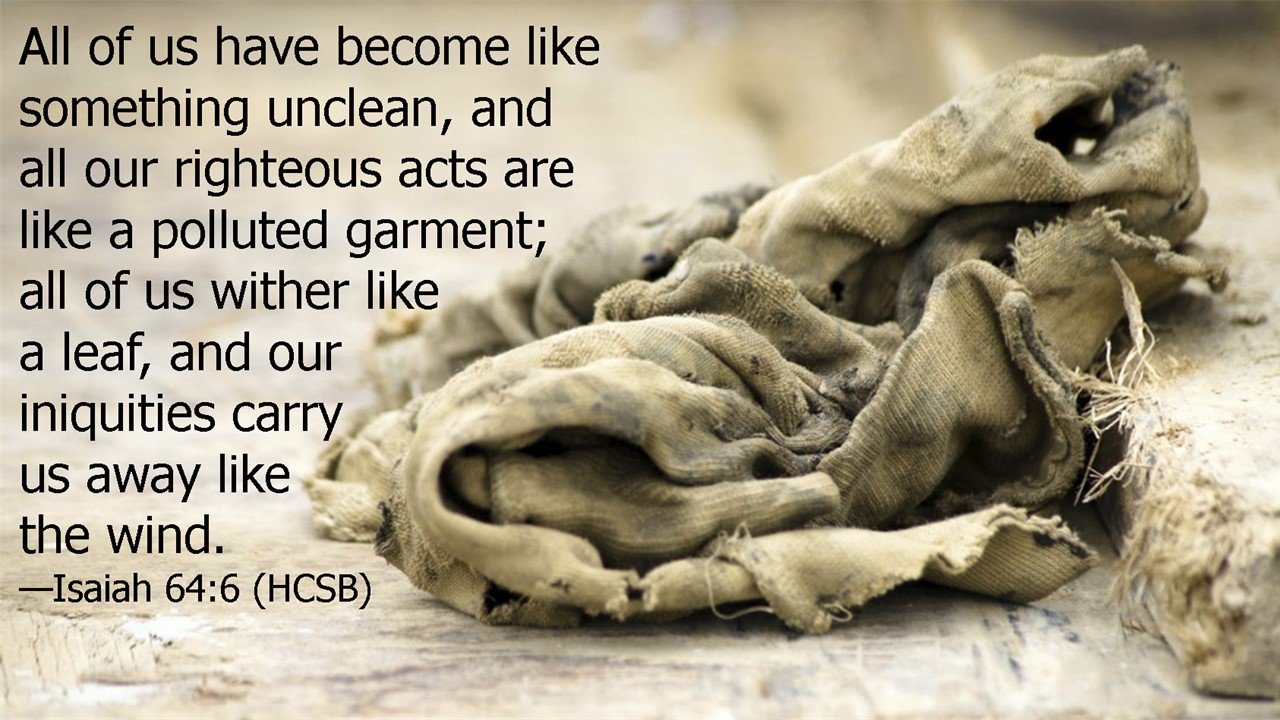
Sing in the choir? Filthy rag. Tithing 15% instead of 10%? Filthy rag. Perfect Sunday school attendance? Filthy rag. Being a Sunday school teacher? Filthy rag. We have all become unclean, we all wear filthy rags.
So how do we fix it? We can’t. How can *He* fix it? He already did. All we have to do is believe. Romans 4:4-5 says,
Now to the one who works, wages are not credited as a gift but as an obligation. However, to the one who does not work but trusts God who justifies the ungodly, their faith is credited as righteousness.
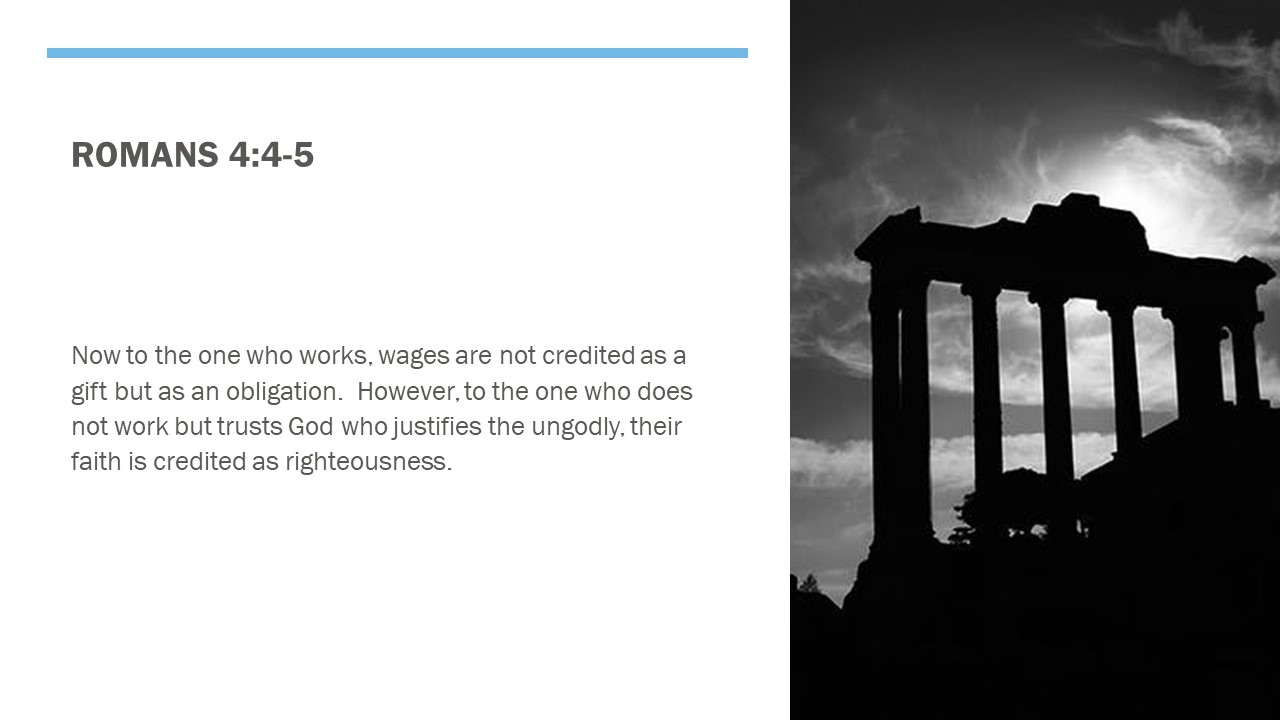 It is our faith in the works of Jesus that saves. When Jesus said this to the crowd of seekers who wanted a sandwich instead of manna from heaven, it drove them away. The good news, the gospel, is a stumbling block. It is offensive to fallen man because it takes away my ability to boast about myself. We are all trying to earn something from God so that we can have bragging rights. Man hates that message that salvation is paid for by somebody else. We want to work for it so we can work harder than somebody else so that we can say, well, at least I’m better than that person.
It is our faith in the works of Jesus that saves. When Jesus said this to the crowd of seekers who wanted a sandwich instead of manna from heaven, it drove them away. The good news, the gospel, is a stumbling block. It is offensive to fallen man because it takes away my ability to boast about myself. We are all trying to earn something from God so that we can have bragging rights. Man hates that message that salvation is paid for by somebody else. We want to work for it so we can work harder than somebody else so that we can say, well, at least I’m better than that person.
That’s not the gospel. John 14:6,
Jesus answered, “I am the way and the truth and the life. No one comes to the Father except through me.

Acts 4:12,
Salvation is found in no one else, for there is no other name under heaven given to mankind by which we must be saved.
God fixed our problem, and there’s no other way, no way to fix it ourselves. Remember immediately after the fall when Adam and Eve clothed themselves with a fig leaf? Did that cover their nakedness, restore their relationship with God? God provided a foreshadowing of the sacrifice of Jesus in Genesis 3:21,
The Lord God made garments of skin for Adam and his wife and clothed them.
God fixed the problem. God fixed their nakedness by clothing them with the skin of a sacrificial animal. God will clothe us. We can trust that God will provide our sin sacrifice. The gospel is that He did the work, not us, and we just believe in Him. Remember Paul a little while ago, before he knew Christ, he considered himself the perfect Jew and earning his way to heaven? But then Paul became a Christian, and how does he feel about his perfect works? It’s the very next verse, Philippians 3:7-9 –
But whatever were gains to me I now consider loss for the sake of Christ. What is more, I consider everything a loss because of the surpassing worth of knowing Christ Jesus my Lord, for whose sake I have lost all things. I consider them garbage, that I may gain Christ and be found in him, not having a righteousness of my own that comes from the law, but that which is through faith in Christ—the righteousness that comes from God on the basis of faith.
Our righteousness is found in Him, no where else. I have no righteousness of my own, only thru faith. My works are garbage, filthy rags, compared to the glory of Christ.
So when Jesus told the crowd that all they have to do is believe in Him, did they understand? Verses 30-31 –
So they asked him, “What sign then will you give that we may see it and believe you? What will you do? Our ancestors ate the manna in the wilderness; as it is written: ‘He gave them bread from heaven to eat.’”
The crowd is still confused, but if Jesus will just give them a sign. We need a sign first. This is what, like the 4th or 5th sign in the last 24 hours. They are literally asking for a sign for more bread the day after Jesus gave bread to 5000. But like many seekers, like many following prosperity gospels, the crowd wants Jesus to perform according to their schedule.
And we still do the same today. Ok, so you’re Jesus, what have you done for me today? Show me a sign if you’re God. Like balance gravity and centripetal force so that I can stand on the surface of earth, neither being crushed by gravity nor being flung into space. Like balancing the atmosphere with just the right balance of oxygen so I can breathe. Like making the sun rise so I can work and the sun set so I can sleep. Like giving me a soul that knows there’s more to life than just bread and circuses, that there must be a purpose. Seriously, Jesus, what have you done for me lately?
The crowd tells Jesus, your signs aren’t enough like Moses. What was manna the people wanted? The Hebrew word “manna” literally means “what is it?” The Israelites fleeing Egypt had no idea what it really was. They had to gather it daily, depend on the Lord daily. The people were still asking for a miracle that they wanted, they still wanted Jesus to rescue them from Rome like Moses did with Pharaoh. And Christ corrects them yet again in verses 32-33 –
Jesus said to them, “Very truly I tell you, it is not Moses who has given you the bread from heaven, but it is my Father who gives you the true bread from heaven. For the bread of God is the bread that comes down from heaven and gives life to the world.”
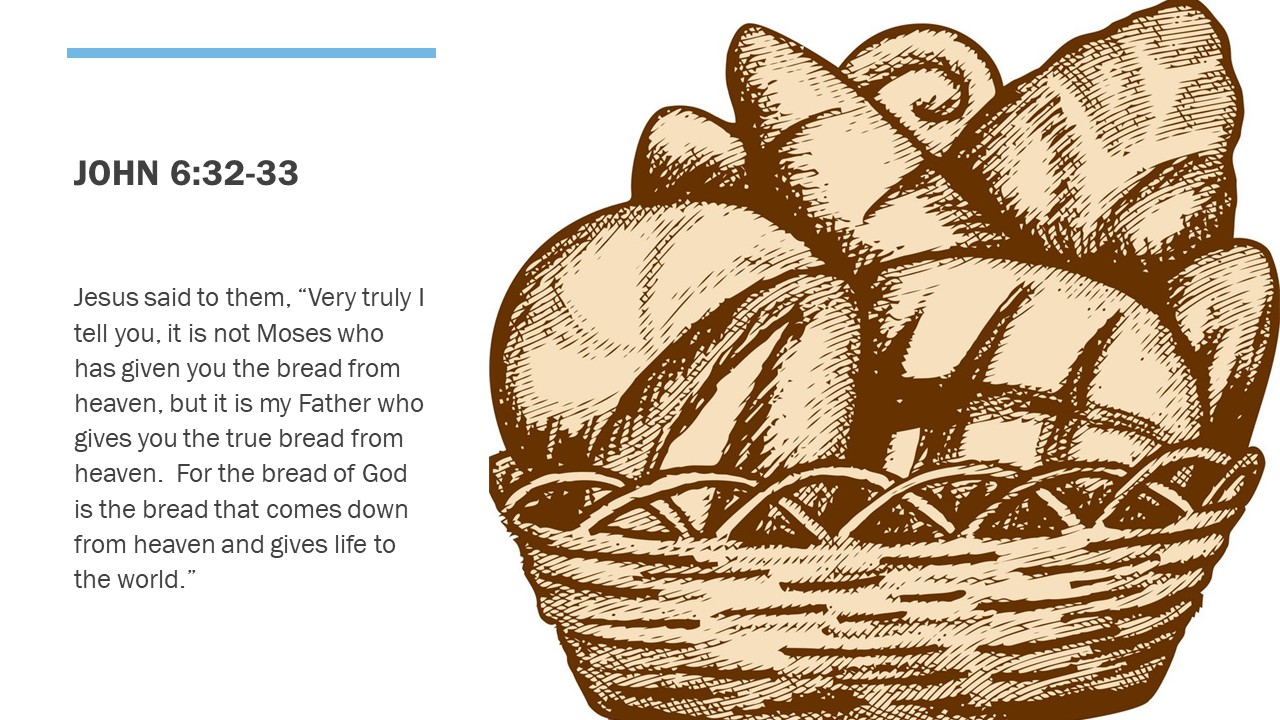 Christ tells them that their thinking is stuck in the past. The people want a rescue from Rome, but Jesus is saying them that’s like getting physical bread for one day. Instead, focus on spiritual bread that feeds for eternity. Focus on true bread that comes from heaven.
Christ tells them that their thinking is stuck in the past. The people want a rescue from Rome, but Jesus is saying them that’s like getting physical bread for one day. Instead, focus on spiritual bread that feeds for eternity. Focus on true bread that comes from heaven.
Notice Jesus says this with the words “very truly” or maybe your version says “truly truly.” Or maybe you’re using King James, “verily verily” which for some reason wants me to add “life is but a dream.” Literally, the Greek repeats the word twice, “Amen, amen.” In the Greek, this means it’s absolute dogmatic 100% certain fact. It means no doubt, no question, with certainty, completely true. And Jesus repeats again that this is a gift, “it is my Father who give you the true bread.” This gift is not obtained by any sort of human effort.
And the crowd still doesn’t get it. Many Christians today don’t get it, either. In verse 34,
“Sir,” they said, “always give us this bread.”
First they wanted to make Him king. Then they downgraded Him to rabbi or teacher. Now it’s just “sir.” Their question is confused, give it to us, where is it, how do we find it? And then Jesus begins the first of the “I am” discourses, His teaching to us about His character, what He does for us, how to have a relationship with Him. If you want to understand how to be close to Jesus, get to know Him, and verses 35-40 provides so much information –
Then Jesus declared, “I am the bread of life. Whoever comes to me will never go hungry, and whoever believes in me will never be thirsty. But as I told you, you have seen me and still you do not believe. All those the Father gives me will come to me, and whoever comes to me I will never drive away. For I have come down from heaven not to do my will but to do the will of him who sent me. And this is the will of him who sent me, that I shall lose none of all those he has given me, but raise them up at the last day. For my Father’s will is that everyone who looks to the Son and believes in him shall have eternal life, and I will raise them up at the last day.”
Jesus is the bread of eternal life. He uses the same phrase for “I am”, in the Greek it’s “ego eimi.” This phrase only belongs to God, but Jesus goes beyond that, “ego eimi” about himself. I AM the bread of life. “He who believes in Him” is the only condition. if you receive it, there is no more spiritual hunger or thirst, original sin no longer alienates you from your creator, it is fixed once and for all.
Jesus says in John 4:13,
Jesus answered, “Everyone who drinks this water will be thirsty again, but whoever drinks the water I give them will never thirst. Indeed, the water I give them will become in them a spring of water welling up to eternal life.”
This was Jesus’ purpose. It’s why he was born, lives, and died for us. Everyone that accepts that has eternal life, saved eternally from damnation. And He will wipe every tear from our eyes, saving us from death and sorrow and pain, for the former things have passed away. He did not come to make us a sandwich, and yet people still demand things they think they are owed. I I I I me me me me. Jesus wants us to accept what he gives freely and abundantly. Eternal life.
And yet after all the teachings and miracles, people still won’t believe. Verse 36 Jesus says the people have seen Him and still do not believe. It’s because they’re focused on physical, not spiritual. They’re focused on Moses, not Jesus. They’re focused on temporal, not eternal. They’re focused on I instead of being focused on “I AM.”
Conclusion
Jesus is the bread of life, life abundant, life eternal. He says in John 6:51,
I am the living bread that came down from heaven. Whoever eats this bread will live forever. This bread is my flesh, which I will give for the life of the world.”
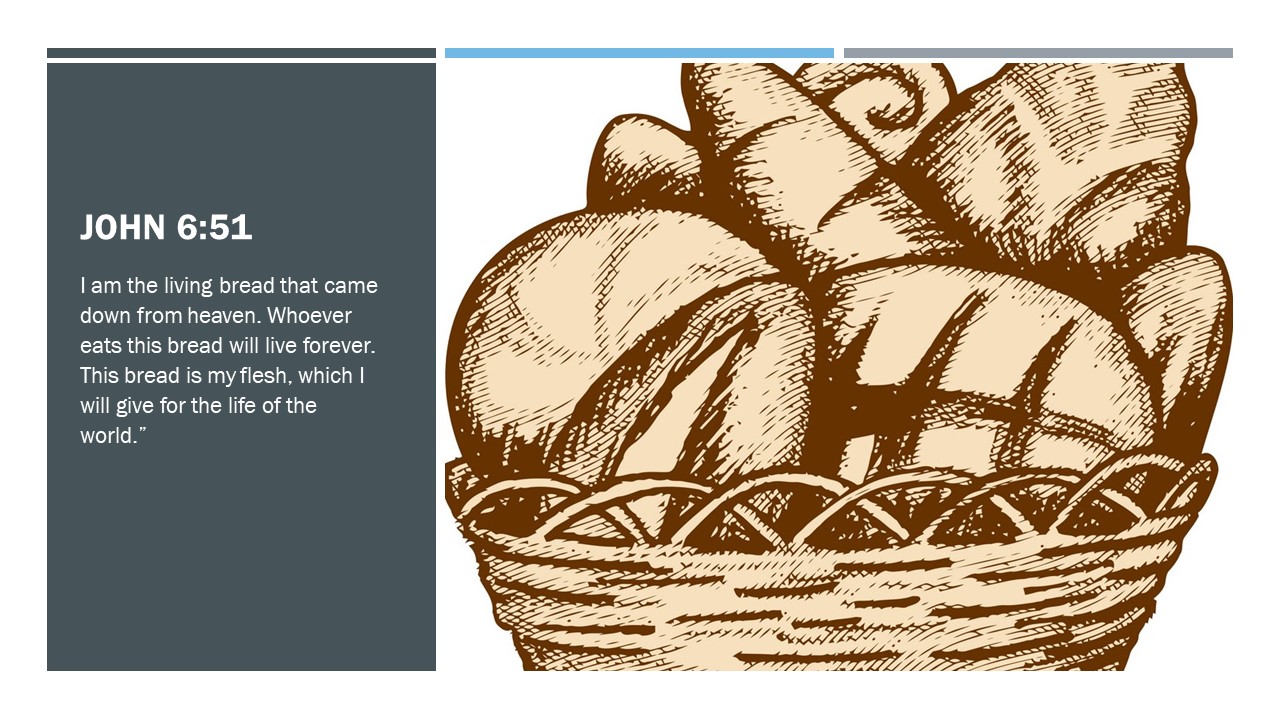
Jesus foreshadows His sacrificial death for all of us, giving up His life so that we may live. It’s no coincidence that Jesus gave us his “I AM the Bread of Life” discourse during Passover week. The Jews would be remembering that God provided manna during the Exodus, bread which symbolized God’s presence, sustenance, and provision. Jesus is now saying, “I AM this bread.”
This salvation is open to everyone who accepts this sacrifice. Not because of I I I I me me me me look at me. We cannot boast about our salvation, but let the one who boasts boast in the work that Jesus did.
Jesus is the only true bread of eternal life.
To God be the glory.


Leave a comment